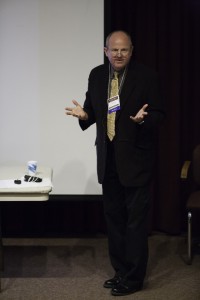
J. Dee Higley offered interesting insights on addiction during his Monday Education Week lecture “Families, Genes, and Addiction: Treatment and Prevention Implications”.
Higley talked about how addiction has the ability to rob us of our agency. It is a disease which has clear diagnostic criteria for which a person must qualify. Some people claim that it runs in the family, others swear it is the addict’s own fault. So who is to blame?
Higley explained that there are genes for addiction, but the more important determinant is a person’s environment. He referenced Doctrine and Covenants 121:45, telling those in attendance to love people, show compassion and have charity.
While Higley said we shouldn’t judge the parents of addicts, he emphasized the importance of parents’ roles in the lives of children. Having even one parent around can greatly decrease a child’s chance of developing an addiction, which Higley concluded in his research with monkeys.
Higley’s research focuses on the effects of mother-reared monkeys and peer-reared monkeys. Monkeys who had adults in their life had much higher levels of serotonin (a chemical in the brain that contributes to happiness and well-being) than those who did not have adults around.
“The monkeys that were peer-reared showed high levels of anxiety,” Higley said.
Higley’s research shows how important environment can be. However, even if a child has the best parents and receives lots of attention, if they are predisposed, they can still develop an addiction. He goes on to say that no child is the same and there is no recipe for prevention. Parents should do their best but not be too hard on themselves if their child becomes an addict.
By following “The Family: A Proclamation to the World,” parents can help prevent addiction for their children, even if they carry the gene for it. That way, the importance of nurturing becomes simple and profound.




